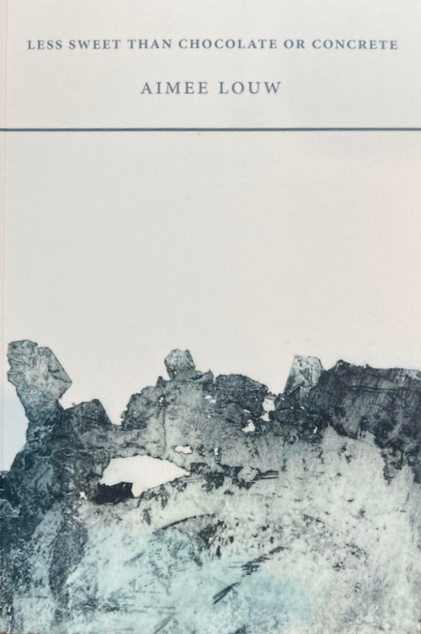
Less Sweet Than Chocolate or Concrete by Aimee Louw
Frog Hollow Press, 2020
Review by Neil Surkan
“Crip Poetics is my thesis title / I don’t really know what poetics means.” So ends the penultimate poem in Aimee Louw’s new chapbook, Less Sweet Than Chocolate or Concrete, a recent addition to Frog Hollow Press’ Dis/Ability series. While it’s clear that Louw is an experienced poet and could probably articulate a convincing definition of “poetics” if necessary, a rejection of “mastery”––of writing with performative authority––pulses at the heart of this collection. Instead, these poems ask radical questions about complicity and belonging––all while inhabiting the tension of calling for “equal access” as a settler with a disability on unceded land, and interrogating the comforts that come at the expense of others.
In more ways than one, Less Sweet dismisses boilerplate inclusivity and invites us, instead, into a subtler, more particular, more painstaking reality––a reality in which acting with a conscience demands that one reckon with multiplicity and incongruence. The book chronicles Louw’s move from so-called Montreal to so-called Vancouver, and the questions about ancestry and colonial legacy the move inspired. As a writer with South African roots who has just moved from one Canadian city to another, she won’t let her desire for “unspectacular / belonging” distract her from the knowledge that making home on colonized land renders her complicit in colonization: “The settler project of I belong / I belong here too.”
The way forward, for Louw, is to build community around uncertainty; around the refusal of tidy, reductive solutions. Part journal entry, part research essay, part collage of quotes from fellow scholars and poets, the resulting suite is both tenderly personal and intrepidly activistic.
The collection opens with an “Introduction” which begins in prose––“One time I edited a friend’s paper and found out that there was a language for the deep and mostly hidden and emerging … struggle between conforming and outlying”––before the paragraph shatters into fragmented lines:
Assimilating and being
A language and body of work that accepted and valued
What I think I had been conditioned to hide
Be ashamed of
Immediately, one of Less Sweet’s most impressive attributes comes to the fore: the way Louw disrupts our expectations. Poetry chapbooks rarely include an introduction, and this introduction is the first I’ve read that begins in prose before literally unravelling down the page. By inhabiting the interstice between prose and free verse, Louw’s poetry postpones a sense of familiarity: both form and content dramatize the “struggle between conforming and outlying.” In turn, these poems oppose complacent reading, delay immediate comprehension, and eschew coercive classification in favour of a continuous negotiation. By the end of the introduction, Louw’s speaker, too, tells a story of venturing into uncharted modes of being:
A year into my Masters…I was ready to escape the community commitments I had built
myself within; a mould
Less sweet than chocolate
Or concrete
Mould-less and intuitive, the poems that follow make the personal political as Louw’s speaker searches for a new sense of belonging––belonging that engages both what’s visible and invisible, what’s chosen and inherited.
At base, that’s what appears to drive this book: rigorous responsibility. Even when Louw chronicles her own experiences of navigating different cities in a wheelchair, and even when she remembers being asked invasive questions about her body––“Surrender – when asked do I feel pain all – / The. time?!”––she continues to focus on her place in Canada’s wider colonial legacy. Every intention and action reverberates, and Louw’s poetry expresses those reverberations’ effects on others in order to, wherever possible, lessen them. Such sensitive, compassionate activism begets a radical humility. The final poem in the collection, “Poetry is My Primary Partner,” sums up as much: “She [poetry] holds me, encouraging me to be brazen in my vision, faithfully consistent / reminding me not to be a know-it-all.” Hearteningly unsettling, these poems attend to the fragility of relation.
Neil Surkan is the author of the poetry collections Unbecoming (forthcoming Fall 2021) and On High (2018), both from McGill-Queen’s University Press, and the chapbooks Their Queer Tenderness (forthcoming from Knife-Fork-Book, 2020), and Super, Natural (Anstruther Press, 2017). His most recent poems have appeared or are forthcoming in The Fiddlehead, Canadian Literature, THIS Magazine, Prairie Fire, The Literary Review of Canada, PRISM international, and Riddle Fence, among others. He lives in Calgary, Alberta, Canada.